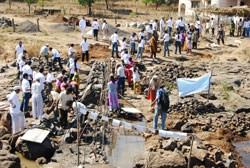
A joint venture between Tata Industries and Tata International has resulted in a project to construct a mini dam in a Maharastrian village in India. The JV, Drive India Enterprise Solutions (Diesl) has started constructing the dam, which will provide water for the village for the entire year, as part of its rain-water harvesting and village development projects. Diesel is also focused on “community building activities, sustainable agro-based and livestock development activities and health improvement activities.”
Mumbai: Drive India Enterprise Solutions (Diesl), a Tata enterprise (a joint venture between Tata Industries and Tata International), initiated ‘Shram Daan’ to construct a mini dam in the village of Jarandi in Thane district. This construction was undertaken by over 100 employees from Diesl on January 22, 2011, and is a part of the village development programme initiated last year by the company.
The mini dam measures 65 feet in length and five feet in height with a total capacity of 20 lakh litres of water, which will benefit the human and livestock populations of the village for the entire year. The construction of the dam is part of the ‘rainwater harvesting’ project under the village development programme. Apart from the construction of the bund, repairs of the bore-well and rainwater harvesting by developing a recharge pit close to the bore-well are also the other activities under the water resource improvement initiatives.
Apart from the water-resource improvement initiatives, the village development programme also covers aspects such as community building activities, sustainable agro-based and livestock development activities and health improvement activities. A medium-sized village, Jarandi has a population of 600 people mainly employed with livestock and agro-based activities. There is a significant population (37 per cent) of landless labourers, with over 73 per cent below the poverty line. The water resources are limited and are unhealthy for consumption.
Says Ajay Chopra, chief executive officer, Diesl, “Under CSR projects, usually companies provide funds. It is important that the employees of the organisation are personally part of the projects in order to build a sense of ownership and connection with the beneficiaries. Diesl employees not only give a part of their salaries for these projects but are also personally taking part in these initiatives. The construction of the bund by the employees is an example of our CSR approach.”
Diesl will be closely monitoring this extensive and comprehensive three-year plan with an internal audit team with a view to duplicating the model in other villages in the country. http://www.orissadiary.com/ShowBussinessNews.asp?id=24196
